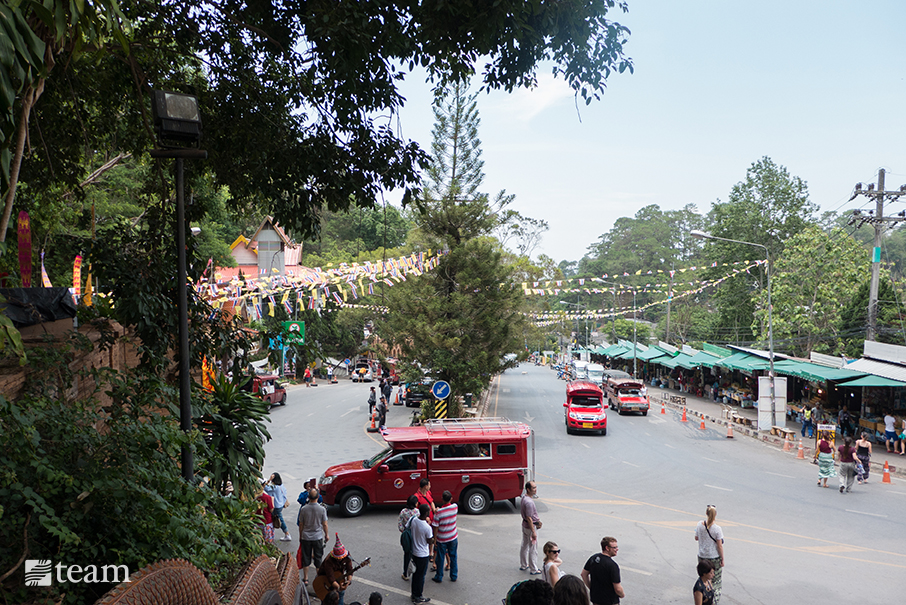
Ministry Updates
Making Disciples who Make Disciples
January 14, 2022
by Heidi Chupp

When Stuvan read the message from a colleague introducing him to Balraj, a church planter asking for discipleship, he paused before answering.
It could have been a no brainer. Stuvan, a south Asian TEAM missionary, is passionate about mentoring national workers in foundational Christian beliefs.
Instead, he took the time to ask questions, do research and pray for guidance.
Was Balraj serious about serving God and about being trained? Was he faithful?
Did Balraj have the time for discipleship with Stuvan? Was he available?
And was Balraj willing to learn? Was he teachable?
“I really wanted to make sure,” Stuvan says.
Before Discipleship, and After Discipleship
Stuvan remembers what his own life was like before he was discipled, and what a transformative process that was.
He and his wife, Amara, were already fully engaged in ministry in Thailand, working among south Asians from a variety of nations who had come to find employment and support their families back home.
The organization they were previously with placed a heavy value on establishing churches but very little focus on discipleship. Stuvan gradually began to see how problematic this paradigm was.
If a pastor was never given the opportunity to learn and apply Jesus’ teachings, wondered Stuvan, how could he be expected to teach his church members? He took a step back from his church planting activities to pursue discipleship.
Then, when he and Amara joined TEAM, trusted co-workers spent time coaching him, showing him what it practically looked like to love and serve Jesus.
It was a turning point, and one that set the trajectory of his life.
And when that season of discipleship was over, he realized it was time for him to do the same.
“Now it’s my turn to disciple others,” Stuvan says.
Faithful, Available, Teachable
A few weeks after Stuvan was first introduced to Balraj, Stuvan had the answers to his questions.
Balraj was indeed serious. He was already active and committed in his church-planting work, even though he’d never been discipled.
Balraj had already made time to repeatedly contact Stuvan, and it was clear he would be available to meet for training.
And would Balraj be teachable? That question was answered in the numerous texts Stuvan had received from Balraj that said in essence, “I am ready to learn from you.”
So Stuvan agreed to disciple Balraj.
“He already had the desire to serve the Lord,” Stuvan remembers, “but he just didn’t know how to do it.”
Making Disciples who Make Disciples

Despite the global pandemic, Stuvan’s discipleship efforts are producing mature believers all across Asia.
Over the last few years, Stuvan has been mentoring five men, all from different south Asian countries, whom he met through his and Amara’s ministry.
“One of our goals is to raise national leaders,” says Stuvan.
Due to the global pandemic, their connections these days are all online, but Stuvan says that’s just a small part of what discipleship is all about. Doing life together is priority.
“For me, discipleship is not teaching,” he says, “but discipleship is living it out and showing them, like Jesus did for his disciples.”
One of Stuvan’s mentees spent more than a year with Stuvan and Amara before returning to his home country. Stuvan invited him to be part of their daily life and ministry, teaching primarily by example. The only time he was not with Stuvan was when he slept!
“Now,” says Stuvan, “I don’t really have to do much.”
The man he discipled is now mentoring and training others. And that’s Stuvan’s entire goal.
“That is what I want them to see,” he says, “that they can also put that effort to their own disciples.”
Learning, then Living it Out
Currently, Stuvan has been meeting with Balraj every week over Zoom, and he has plans for in-person connection once the pandemic restrictions ease.
It’s only been a few months since Stuvan began his discipleship work with Balraj, but in that space of time Balraj is already sharing what he’s learning with others.
And now that Balraj understands the value of discipleship, he wants to go back to some of the churches he established and offer that same training to the believers there.
“He’s been very effective,” says Stuvan. “One of his colleagues also wants to learn from me.”
A Global Church Effort
As Stuvan looks to the future and where he wants to invest his energies, he’s putting his passion for discipleship into establishing an accredited Bible college, to convey these principles to a larger group than he could do on his own.
It’s a vision that’s multi-site and multi-nation, and it involves a global Church effort.
Instead of national workers having to leave their ministry work, cross borders and navigate different cultures just to attend Bible college, Stuvan wants to bring the Bible college to them. He’s setting up a number of centers in different south Asian countries where seminary-trained TEAM missionaries, whose ministries are nearby, will come to teach and share their own experiences.
Growing and Maturing
While Stuvan isn’t driven by the numbers of churches or the pace at which they are established, he does see evidence of spiritual growth.
Even in the midst of a global pandemic, says Stuvan, in every Asian nation where he has a disciple, churches are developing and church members are maturing in their faith.
“We are just rejoicing,” he says. “It’s not us who is doing it. It’s them, with the Lord.”
“Nothing is stopping God in action.”
Related articles


